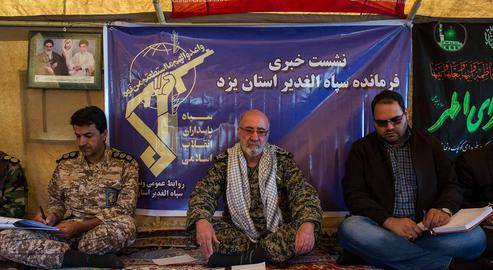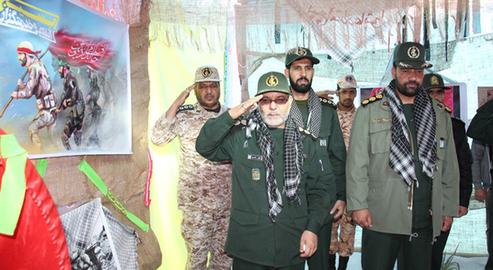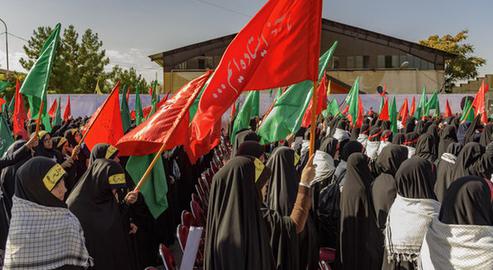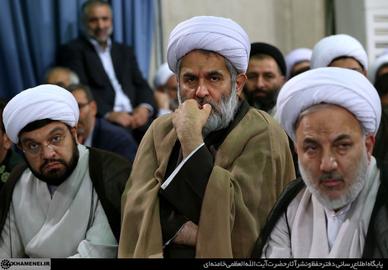The Revolutionary Guards: An Introduction
The Islamic Revolutionary Guard Corps (IRGC) is the Islamic Republic of Iran’s most important institution. The military-security institution commands huge influence in every aspect of Iranian public life, from culture and the environment to the economy, politics and judicial process. Whatever the field or area, the IRGC is not required to report to anybody and is answerable to no one.
The IRGC was created early after the 1979 Islamic Revolution by the order of the founder of the Islamic Republic, Ayatollah Ruhollah Khomeini. Its declared mission was to safeguard the revolution and its accomplishments. As the years have gone by, it has expanded its sphere of activities. The entities under its control have multiplied to such a degree that it now operates effectively as a parallel government. It interferes in all current affairs of the country and it aims to have control over every aspect of the way Iran is run.
In a series of reports, IranWire presents a detailed portrait of this powerful and mysterious institution and, for the first time, identifies and explains all bodies, institutions and other entities operating under the umbrella of the Revolutionary Guards, at the same time outlining its activities through an infographic and an interactive diagram.
The infographic is a visual representation of the Guards’ organizational structure and presents all institutions under the control of IRGC in one map. It resembles a family tree, a portrait of the IRGC with all its children, grandchildren and great-grandchildren — a dramatic picture of power in Iran today.
In the interactive diagram, the viewer is able to use the mouse to see how various entities under the control of the Guards emerged, and how they are connected — exactly like a family tree.
IranWire has aimed for this series and the overall project to be informative and a solid research tool. But it is not perfect, and there will always be room for updates, enhancements and further information. We welcome your views, ideas and knowledge, so please do get in touch via email, Twitter or Facebook.
***
The IRGC Provincial Corps (Sepaheh Ostanha)
The IRGC Provincial Corps was created in the summer of 2008. In that year, with an order from the chief commander of the IRGC, the Basij Resistance Districts in each province left the Basij and, along with the IRGC Ground Forces units in different areas, formed the IRGC Provincial Corps. The commander of this corps is appointed by the chief commander of the IRGC. According to the IRGC’s expansion plan, which was written by the IRGC’s Strategic Center and confirmed by the Supreme Leader, the reason for the establishment of the corps was to decentralize the IRGC and increase the local power and authority of local IRGC forces and their commanders. After these changes, each corps gained more independence and established its own financial, cultural and social subunits under the titles of various headquarters and organizations. There are 32 IRGC corps across Iran. Tehran province has two corps. Mohammad Rasoul-Allah Corps operates in the capital Tehran and its Shemiranat suburb and Seyyed-al-Shohada Corps operates in small towns and villages in Tehran province. The Mohammad Rasoul-Allah Corps was tasked with suppressing the protests across the capital during the 2009 post-election Green Movement. This task was assigned by order of Iran’s Supreme Council of National Security.
Subunits of the Corps are Beit-al-Moqadas Rapid Response Battalion (men) and Al-Zahra Battalion (women), which are ready-to-fight units, and Ashura Battalion (men) and Al-Zahra Battalion (women), which are back-up units. Imam Ali Security Battalion is another active unit and is tasked with suppressing civil unrest and riots. Imam Hussein Battalion is tasked with defending the country against foreign and security threats. At the end of 2015, there were estimated to be around 500 battalions in total.
The IRGC Ground Forces have 32 provincial corps in Iran’s 31 provinces:
1.Mohammad Rasulullah Corps in Tehran province is the largest IRGC corps and is commanded by General Mohammad Reza Yazdi. Following an announcement of structural changes in the IRGC Ground Forces in 2007, this corps was formed through a merger of Mohammad Rasulullah 27 Division and the Tehran Provincial Corps, the Sar-Allah Headquarters. The corps is charged with coordination and command of Basij and the IRGC Ground Forces and is responsible for the security of the capital. Under the tenure of its one-time commander, General Abdollah Araqi, the corps played an active role in suppression of the protests following the presidential elections of 2009 and was granted the control of the city of Tehran by the Supreme National Security Council. The corps used to be under the command of the deputy commander of the IRGC who jointly occupied the command of the Sar-Allah Headquarters in Tehran. After the 2017 terrorist attacks by Daesh, the command and control were divided between the corps and Sar-Allah Headquarters.
2.Al-Qadir Corps in Yazd province is commanded by General Fathollah Jamiri.
3.Imam Hassan Mujtaba Corps in Alborz province. is commanded by General Ali Ostad Hosseini. In 2016, Ostad Hosseini claimed that the IRGC Corps in Alborz had created 6,000 jobs by commissioning small projects, including the construction of mosques and repairing schools and bridges. He also claimed that the corps dispatched a number of medical and infrastructure teams annually from the IRGC’s construction jihad of Basij to the province’s villages.
4.Imam Reza Corps in Khorasan province is commanded by General Yaqub-Ali Nazari. In 2019, he claimed that the corps had implemented 2,000 poverty alleviation projects in the province through the Basij and Shahid Brounesi Headquarters and the IRGC Progress and Development (pishraft va abadani) Headquarters.
5.Imam Sajad Corps is in Hormozgan province and is headed by Colonel Abazar Salari.
6.Imam Sadeq Corps in the province of Bushehr is commanded by General Ali Razmjoo. In 2018, Razmjoo told the media that the corps had spent 800 billion rials on poverty alleviation projects. These include 1,000 residential units, the construction of schools, mosques and health units.
7.Amir- al-Momenin Corps in Ilam province is commanded by Colonel Jamal Shakermi.
8.Ansar- al-Reza Corps in Southern Khorasan province is commanded by General Ali Qassemi. In 2019, Qassemi told the Mehr News Agency that the corps had inaugurated 750 infrastructure projects in the province. In 2019, he also announced the formation of a coordination centre along with a social division that would deal with social problems and poverty in the province.
9.Ansar- al-Hussein Corps in Hamedan province is commanded by General Mazaher Majidi. In February 2019 Majidi claimed that the corps had implemented 1,040 projects in rural water and sewage, agricultural water, and the revival of qanats and school reconstruction.
10. Ansar- al-Mahdi Corps in Zanjan province is commanded by General Jahanbakhsh Karami. In 2018, Karami told the Mehr News Agency that the corps has implemented more than 620 poverty alleviation projects in cooperation with the IRGC Poverty Alleviation Headquarters. These projects are in water transfer, drinking water, mosque, agricultural lands and health centres.
11. Beit-al-Moqadas Corps in the province of Kurdistan is commanded by General Mohammad Hossein Rajabi. In February 2019, Rajabi claimed the corps had implemented about 6,000 poverty alleviation projects in the province in the last eight years. The province has been a site of inter-border clashes between the armed Kurdish position group, the Democratic Party of Kurdistan and the corps. In 1996, the Party agreed to cease its military activities inside Iran. In 2018, a new wave of clashes occurred between the Party and IRGC members causing the deaths of 20 IRGC members and 11 Kurdish rebels. In September 2018, the corps confirmed that it launched a missile strike against the headquarters of the KDP in Iraq. The strike reportedly killed 15 people and wounded 50 others.
12. Sar-Allah Corps in Kerman province is headed by General Gholam-Ali Abuhamzeh. Like other provincial corps, it is in charge of the coordination and preparation of Basij forces. According to Abuhamzeh, (the corps organizes 30,000 Basij forces in two districts of Hazrat Rasul, Hazrat Amir- al-Momenin, including the Basij branches in various professions and neighborhoods. More recently, the corps announced the discovery of explosive devices during its joint operation with the IRGC Corps in Sistan and Baluchestan. Recently, Abuhamzeh verbally attacked the members of parliament in the province for being financially sponsored by the reformist party, Kargozaran. Following a protest by these members of parliament against these accusations, Abuhamzeh remarked, “ I boldly announce that the IRGC will confront anyone who decides to act against the people and the system. We will come after every one of you.”
13. Javad-al-Aeme Corps in Northern Khorasan province is commanded by General Seyyed Hussein Mortazavi. Recently, he announced that the corps had dispatched 200 jihadi construction groups made up of Basijis to impoverished areas of the province. This was done as part of the framework of the Mohammad Rasulu llah 2 military exercises, through which 16 Basij battalions were sent to the main parts of the city and their camps to engage in martial and physical exercises.
14. Hazrat Abulfazl Corps in Lorestan province is commanded by General Morteza Kashkuli. Recently, Kashkuli announced the implementation of 1,143 infrastructure projects in the province (with the help of the IRGC Progress and Development Headquarters) in health, and education and social and cultural arenas. According to Kashkuli, the corps will organize 850 construction jihadi groups to start these projects.
15. Hazrat Abbas Corps in Ardabil province is commanded by General Jalil Babazadeh. In 2016 Jalilzadeh told the Mehr News Agency that the Basij’s 22 branches were active in 11 districts of the province and constituted one-third of the province’s population. Babazadeh said that the Basij was implementing programs for education, ideological and religious teaching as well as poverty alleviation and construction projects. According to Babazadeh, the corps coordinates and organizes Basij Battalions in the province for internal security. These include Ashura, Imam Hussein, al-Zahra, Kowsar and Imam Ali battalions. He said that the corps was providing complementary training for more than 1,000 Basijis in the battalions in the same year.
16. Hazrat Qamar Bani-Hashem Corps in Chaharmahal Bakhtiari province is commanded by General Ali Mohammad Akbari. Akbari’s predecessor, General Reza Mohammad Soleimani, said to the media that the corps established seven Imam Hussein battalions and expanded them to twelve battalions during his 10 -year tenure and also formed three new resistance districts. According to Akbari, its new commander, 13 troops from this province lost their lives in Syria to defend the holy Sayyiada Zeynab shrine. In September 2018, the corps organized and dispatched 150 jihadi groups to the impoverished areas of the province during military exercises through the participation of the Ashura and al-Zahra Basij battalions.
17. Hazrat Nabi Akram Corps in Kermanshah province is commanded by General Bahman Riahi. The corps involves the Basij forces in a number of activities, including sending Basiji students to various camps in order to host pilgrims to holy sites. In 2019, Riahi told the media about the inauguration of 44 residential units in the province hit by the 2017 earthquake.
18. Rouh-Allah Corps in Markazi province is commanded by General Mohsen Karami. The Corps’ mission is to aid poverty alleviation based on the resistance economy model. It mobilizes Basij forces to run programs in job creation, the establishment of housing to help the poor and the inauguration of resistance bases and sport and cultural centers. More recently, the corps was given the task of providing services to facilitate the hosting of the Pakistani pilgrims who attend gatherings for the occasion of Arba’een, which is a Shia holy day which takes place on the fortieth day of month of Ashura, honouring the martyrdom of the third Shia Imam Hussein, the grandson of the prophet Muhammad.
19. Salaman Corps in Sistan and Baluchistan province is commanded by Brigadier Ammanallah Gashtasebi. Like other corps, it organizes and mobilizes Basijis for gatherings and exercises. A recent example of this was in October 2019, when 25,000 Basijis were mobilized to attend a gathering, for the third stage of the exercises of the Mohammed Rasulullah Basij Forces.
20. Seyyed al-Shohada Corps in Tehran province is commanded by General Hassan Hassanzadeh. The corps commands all the Basij bases of the cities in Tehran province, with the exception of the capital. The corps was previously commanded by Brigadier Shahcheraqi for less than a year and Ali Nasiri who held the post for six years.
21. Shohada Corps in Western Azerbaijan province is commanded by Brigadier Habib Shahsavari. The corps mobilizes Basij forces through the organization of exhibitions, sending medical teams and jihadi groups to deprived areas and organizing political congregations called enlightenment (roshangari) gatherings. The corps is also active in small development projects such as providing electricity to villages in the province.
22. Saheb- al-Amr Corps in Qazvin province is commanded by Brigadier Mohammad Sharokhi.
23. Saheb-al- Zaman Corps in Isfahan is commanded by General Gholam Hussein Soleimani. Soleimani has gone on record criticizing the economic policies of Rouhani’s government. In 2016, he said, “economic development has to use the “resistance economy” model which is one of the aspects of the Islamic economy.” He added that, “economic problems in the country are the results of implementing an economic model backed by a special group who persuaded the people after the JCPOA and trampled the deprived.” The corps sends jihadi groups comprising of engineers, clerics and students to deprived areas of the province and is involved in small construction projects. These take place through establishing jihadi camps where a number of projects (such as water supply, drinking water and restoration of Husseinehs) are implemented. Following the economic crisis of 2018, that occurred due to inflation and currency collapse, and an impending banking crisis among other factors, the corps set up an anti-profiteering and anti-corruption campaign. In October 2018, the corps announced the discovery of 26 cases of hoarding in Isfahan, worth eight-thousand billion rials.
24. Ashura Corps, in Eastern Azerbaijan, is commanded by General Zein al-abedin Khoram. The corps runs poverty alleviation programs through engaging the Basij in small projects in the deprived areas. These projects are in water provision, job creation and provision of services to villages. In January 2019, Khoram told the media that the corps was forming a convoy for economic help and reconstruction in Syria. According to Khoram, the convoy was the first of its kind in Eastern Azerbaijani province and was aiming to invite investors to engage in reconstruction and generate profit for Iranian companies.
25. Ali-ebn-Abitaleb Corps in Qom province is commanded by Brigadier Mohammad Shahcheraqi. The appointment of Shahcheraqi seems to have taken place two months after a gathering that was held in August 2018 in Fezih seminary in Qom. The event was organized by the hardliners in protest at government policies and economic problems. During a speech by a hardline figure, Hassan Rahimpoor Azghandi, a placard held by a group of clerics threatened the president, Hassan Rouhani. The placard said those who are in favor of negotiation with the United States could end up like former President Hashmi Rafsanjani, an ally of President Rouhani’s, whose death was considered suspicious. The episode was followed by a wave of condemnation by the high ranking, hardline conservative clerics, including Ayatollah Makarem Shirazi who called the event a disaster and asked the IRGC for explanations for permitting the gathering.
26.Fath Corps in Kogiluye and Boyer-Ahmad province is commanded by Colonel Hamid Khorramdek. Previously, he was a deputy commander of the Imam Sadegh Corps in the province of Bushehr. He also served as head of the student Basij and the commander of Malek Ashtar Corps and the deputy intelligence and deputy commander of the Imam Sadegh Corps in the same province.
27.Fajr Corps in Fars province is commanded by General Seyyed Hashem Ghiasi. In 2017, Ghiasi announced that the Fajr Corps is considering allocating credits to 14 deprived areas in the province. In the aftermath of the 2017 earthquake in Fars province, the corps announced that it had provided relief services to the earthquake victims. Ghiasi announced that the Basiji groups were active in medical services, counseling and distribution of food and hot meals to the victims.
28.Qaem Corps, in Semnan Province is commanded by Colonel Hamid Damqani. Previously, he was the commander of the IRGC in the city of Shahrood and deputy coordinator of the IRGC in the province of Tehran. Recently, Damqani announced the formation of 46 neighbourhood Basij zones in the province. According to Damqani, these neighbourhood Basij zones will be active in cultural arenas. He said that the 600 Basij bases provide membership to 212,000 people in the province, and that, of the 700,000 population there, 122,000 are regular Basijis and 90,000 are active Basijis.
29. Quds Corps in Gilan province is commanded by General Mohammad Abdollahpoor. Similar to other provincial corps, the Quds Corps has various programs for Basij mobilizations, such as organising the annual Basij and IRGC military exercises and sending the Basiji jihadi groups to provide relief to deprived areas. In 2018, the corps organized four battalions from Kowsar and Beit-al-Moqadas for the Ashura exercises in the district of Astara.
30. Karbala Corps, in Mazandaran province is commanded by General Mohammad Hussein Babaie. The corps organizes poverty alleviation programs and housing through the mobilization of various branches of the Basij. In the words of Babaie, “ 651,397 people have been involved in the economic sector from the ranks of college students, workers, physicians and engineers.”
31. Neinava Corps in Golestan province is commanded by General Hussein Marufi. The corps engages in the poverty alleviation program and small projects in deprived areas and villages in the province. These projects are in drinking water provision supply, agriculture, manufacturing workshops and the construction of concrete channels, building of schools and sport centres.
32.Valiasr Corps, in Khuzestan province is commanded by General Hussein Shahvarpur. Since 2009, this corps has been charged with hosting the pilgrims as part of the “Voyagers to Light” program.
The Commander in Chief of the Armed Forces
The Chief Commander of the IRGC
The Supreme Leader’s Representative in the IRGC
The IRGC Security and Intelligence Agencies
The IRGC's Social, Cultural, Scientific and Educational Institutions
The IRGC Commercial and Financial Institutions-(Khatam-al-Anbiya Construction Headquarters)
The IRGC Commercial and Financial Institutions-(Bonyad-e Ta’avon-e Sepah)
The Organization for the Mobilization of the Oppressed
The Basij Cooperative Foundation
Cyberspace Institutions and The Physical Training Organization of the Basij
Basij Headquarters and Military Organizations
Basij Social and Cultural Organizations
visit the accountability section
In this section of Iran Wire, you can contact the officials and launch your campaign for various problems




























comments